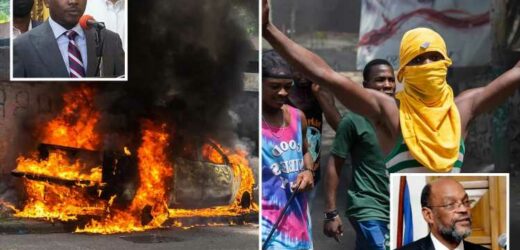THE former Haitian prime minister and the newly appointed PM are vying for control following President Jovenel Moïse's assassination.
Clause Joseph, who recently resigned as PM, claimed he was in charge of the Caribbean country and declared martial law as the country descends into chaos.
🔵 Read our Haiti President assassination blog for the latest updates
Ariel Henry, who was appointed into the top job by the President last week but not formally sworn in, claims he's the official office-holder.
The brazen killing has caused political unrest and a surge in gang violence and a growing humanitarian crisis in the poorest country in the Americas.
Moïse was allegedly killed by a group of foreign "well-trained commandos" posing as US drug enforcement agents who stormed his presidential compound in Port-au-Prince.
The Biden administration said Thursday that it recognised Joseph as Haiti's acting prime minister.
"Claude Joseph was the incumbent in the position. He was serving as the acting prime minister before the assassination of President Moïse. We continue to work with Claude Joseph as such,” State Department spokesman Ned Price said.
White House spokesperson Jen Psaki said the US was pushing for elections to happen later this year.
"We know that free and fair elections will facilitate a peaceful transition of power to a newly elected president and we certainly continue to support Haiti’s democratic institutions," she told reporters on Thursday.
"We will call on all political parties, civil society and stakeholders to work together in the wake of the tragedy and echo the acting prime minister’s call for calm."
Questions have been raised about Joseph's legitimacy after Moïse appointed Henry as Prime Minister last week.
Haiti's constitution also says the president of the Supreme Court should take over as prime minister in the event of a presidential vacancy.
This comes as Haitian police detained 17 suspects connected Moïse's brazen killing, including two US-Haitian dual-nationals.
Miami residents James Solages, 35, and Joseph Vincent, 55, alongside 15 Colombian nationals – six of which are former army members – were arrested on Thursday.
Solages, who lives in Fort Lauderdale, describes himself as a “certified diplomatic agent,” and budding politician on a website for a charity he established in 2019 in south Florida.
Haitian police chief Léon Charles said: “Foreigners came to our country to kill the president. We are going to bring them to justice.”
Three of the alleged suspects – all Colombian – were killed and eight reportedly remain on the run.
Cars were set alight by furious locals after a firefight between cops and the suspected assassins.
Angry crowds gathered near a police station in Petion-Ville on Thursday and torched several vehicles they presumed were used by the alleged gunmen.
Smoke was seen billowing from cars that were set on fire across the Haitian capital Port-au-Prince.
Four more Colombian suspects were identified as Alejandro Girardo Zapata, 41; John Jairo Ramirez Gomez, 40; Victor Albeiro Pinera Cardona, 40; and Manuel Antonio Groso Guarin, 41.
Haitian officials have not released the names of the other men arrested.
Earlier, police had said seven of the assailants were dead but not explain the discrepancy.
Police are continuing the search for more suspects.
In February, opposition politicians nominated their own president in an effort to drive out Moise whose five-year term had expired.
Joseph Mécène Jean-Louis, 72, a judge, said that he accepted the nomination.
Moïse insisted his term in office ended in February 2022 – a claim accepted by the United States.
Videos show the worrying scenes as smoke rises of Port-au-Prince as gun battles rage amid the crackdown.
The specter of a potential foreign intervention by the US has already been raised by observers, and the country has entered a "state of siege".
The troubled Caribbean nation has had a long and violent history as it has been buffeted between dictatorships, military juntas and foreign interventions or occupations since first gaining independence in 1804.
Decades of unrest have already plagued Haiti – with street violence, the rise of powerful and brutal gangs, mass protests and a slow collapse of a weak, corrupt police force.
And to further complicate things the temporary president is supposed to be the nation's Chief Justice, René Sylvestre – but he died last month of Covid.
With no one in charge – and various factions vying for power – the threat of mass civil unrest or potentially even civil war, hangs over Haiti.
Source: Read Full Article
















